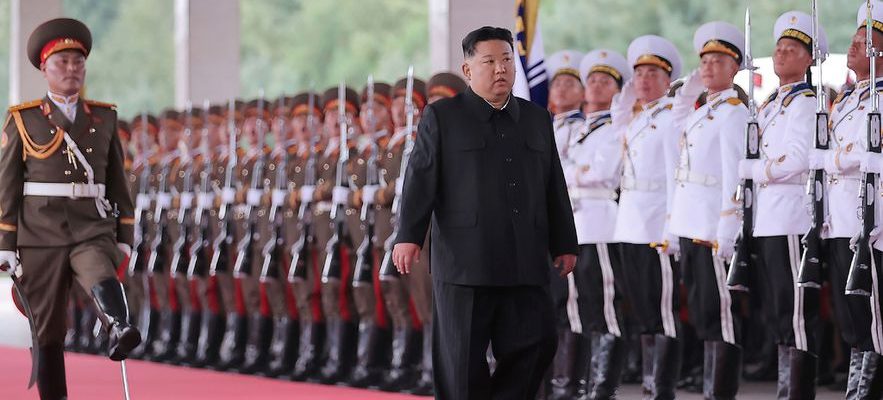Its armored train, a heavy dark green convoy with a yellow stripe traveling at 60 km/h, is expected in Vladivostok at any moment. To bring North Korean President Kim Jong-un out of his lair, an exceptional reason was needed. Meeting Vladimir Putin in the Far Eastern port, where he is attending an economic forum until September 13, is a great one.
The meeting promises to be dense, as the two leaders have “sensitive” things to say to each other, to use the words of Dmitri Peskov, the Kremlin spokesperson. Entangled in the war he is waging in Ukraine, the Russian president needs anti-tank missiles and artillery shells to replenish his stocks. He plans to buy some from his Asian counterpart, who himself has a very extensive “shopping list”. The North Korean dictator is indeed eyeing certain Russian ballistic technologies to launch his satellites and equip his submarines. A priori, therefore, a “win-win” agreement for the pariah leaders, both subject to international sanctions.
Kim has everything to gain
On closer inspection, however, one might fare better than the other. “Obtaining these technologies would allow Kim Jong-un to show the world that a member of the UN Security Council openly supports him in his nuclear program and that his country is not so isolated,” analyzes Antoine Bondaz, responsible for research at the Foundation for Strategic Research. This operation can allow Pyongyang to increase its strategic value on the international stage.” In other words, moving from the status of a rogue state to that of a nuclear dictatorship, which could soon participate in military exercises with its Russian and Chinese allies.
Selling weapons to Moscow would also allow it to earn foreign currency, which the Pyongyang regime is sorely lacking. And we can imagine that the North Korean president, aware of the urgent needs of the Russian forces, will be able to raise the stakes…
Humiliation
North Korean leader Kim Jong Un reviews troops before boarding his armored train for Russia, September 10, 2023 in Pyongyang
© / afp.com/STR
For the Kremlin, on the other hand, the advantages of such a “deal” are less obvious. Showing that the Russian army, considered two years ago as one of the most powerful in the world, is reduced to obtaining ammunition from North Korea, would constitute a very negative signal, particularly to its partners. Africans. Even a humiliation. It is also not certain that North Korean factories will be able to deliver significant quantities of munitions to the Russians. Another uncertainty is the state of ammunition stocks, some dating from the Soviet era.
Finally, delivering sensitive technologies would, for the Russian government, amount to violating the sanctions regime put in place by the UN – with the support of Moscow – to force Pyongyang to denuclearize. That said, it has been a long time since Vladimir Putin stopped bothering with this kind of scruples…
Threat to Seoul
So deal or no deal? It is very likely that some of the discussions will not be made public. “Our countries cooperate in sensitive areas which should not be the subject of public disclosures and announcements. This is perfectly normal for neighboring states,” said Dmitri Peskov. Whether or not he transfers certain sensitive technologies, Vladimir Putin has, in any case, every interest in posing this threat. It will allow him to create insecurity in the Western camp and test the resistance of some of them. First, South Korea.
Officially involved with the West in the policy of sanctions against Russia, the South Koreans have not forgotten the importance of Russia in regional politics. In Seoul, we remember that in 1988, South Korean President Roh Tae-woo launched a major diplomatic offensive against Mikhail Gorbachev. Baptized Nordpolitik, this maneuver then consisted of using Moscow to put pressure on North Korea – and isolate it. Since then, relations between Pyongyang and Moscow have experienced several “glaciations”, notably in the late 1990s and in 2011, when Moscow voted in favor of UN sanctions against Pyongyang. However, they heated up in 2019, during the first meeting between Putin and Kim Jong-un. “One of Russia’s main objectives in North Korea since the early years of Boris Yeltsin’s presidency has been to increase its diplomatic weight there,” we can read in a recent report from the Carnegie Research Center.
“Friend Kim”
If this “summit of pariahs” produces results, Vladimir Putin will be able to use his proximity to his “friend Kim” to put pressure on the South Koreans. And remind them that he could, one day, play a diplomatic role with their dangerous northern neighbor. Like his predecessor Gorbachev…
For the Kremlin, the stakes are enormous. The ninth largest arms exporter in the world, Seoul is one of the leading arms suppliers in Europe. It sells, in particular, tanks and howitzers to Poland, kyiv’s key ally against Russian forces. And last July, South Korean President Yoon Suk Yeol announced that he would increase logistical aid to the Ukrainians. For Putin, all means are good to stop Western support.
